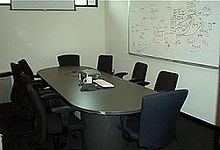| Revision as of 04:27, 11 October 2012 editFeatherPluma (talk | contribs)Extended confirmed users43,267 edits →Introduction and Greeting: per MOS← Previous edit | Revision as of 05:57, 24 January 2013 edit undoEpeefleche (talk | contribs)Pending changes reviewers150,049 edits d uncited per tagNext edit → | ||
| Line 22: | Line 22: | ||
| * Avoid talking to women face-to-face. Also, know that you will be spoken to through a woman (if you are a woman). | * Avoid talking to women face-to-face. Also, know that you will be spoken to through a woman (if you are a woman). | ||
| Also, men should not wear shorts and revealing clothes, and women should cover up their legs. | Also, men should not wear shorts and revealing clothes, and women should cover up their legs. | ||
| ==Gift giving== | |||
| ] | |||
| * It is customary to take a ] if you are taken to someone's home (especially for the first time). | |||
| * The gift may be ]i ]s, ]s and ]. | |||
| * Do not give white flowers as they are used in weddings. | |||
| * Do not give alcohol. | |||
| * Gifts are not opened in front of the giver. | |||
| * Gifts are given and received with both hands. | |||
| * It is usual to receive a gift showing pleasure even one doesn't like the giver. | |||
| ==Topic of conversation== | ==Topic of conversation== | ||
Revision as of 05:57, 24 January 2013
| This article needs additional citations for verification. Please help improve this article by adding citations to reliable sources. Unsourced material may be challenged and removed. Find sources: "Etiquette in Pakistan" – news · newspapers · books · scholar · JSTOR (December 2011) (Learn how and when to remove this message) |
In Pakistan, Islamic culture is predominant but Pakistan also has cultural etiquette based mainly on South Asian influence, as well as British. Pakistan has a rich and vibrant culture. Visitors will find their hosts to be gracious and friendly. English is widely spoken in major cities such as Karachi, Islamabad and Lahore and the business community. Pakistan is an exceedingly tolerant place despite its governance upon Islamic Shari'ah. Visitors should note that there is a large cultural and economic gap between the social classes. Over the past decade, the middle class in particular has been affected by Pakistan's economic and political upheaval, but is still rapidly increasing. It is best, however not required for visitors to have a local host who can assist and accompany them throughout their trip. The new etiquette in Pakistan is a combination of western and eastern etiquette as Pakistan people are very much attracted to the western norms and values.
Introduction and greeting

- It is customary to say As-Salamu Alaykum (May Peace Be Upon You). The reply to which is Wa alaikum As-Salam (And May Peace Be Upon You Too). Western greetings are also acceptable. The greeting is usually initiated by the person entering a conversation or gathering, or a host.
- It is considered rude to introduce yourself to strangers, it is generally advisable to ask some mutual acquaintance to introduce you. Strangers will speak with each other in the "formal" register of Urdu, and using the familiar register will be seen as very rude.
- People of opposite sex do not shake hands when they greet each other. It is sometimes usual among men to put the left hand on your chest (heart) when shaking hands. In urban Sindh and in other parts of the country, men and women usually lower their head and lift their hand to their forehead to make the "adab" gesture when greeting each other.
- When being introduced to elders or strangers while seated it is customary to get up as sign of respect.
- When seated feet or shoes should not be pointed towards anyone. The soles of shoes, sandals or feet are considered unclean.
- It is advisable to ask a person how they wish to be addressed.
- Generally, women who know each other kiss and hug as greeting while men who know each other often hug each other as a form of greeting. Pakistanis take their time during greetings and ask about the person's health and family.
- It is also customary for a Pakistani to reply "fine" or "Thank God" when asked about their health even if you are visiting them at a hospital. Similarly, it is common to say "Allah ka shuker hai" (Thank God) or "Alhamdulillah" (Praise to God) as an answer to any inquiry about one's health, family or business condition regardless of actualities.
- When leaving a gathering it is customary to say Allah Hafiz (May God Protect You).
Dress
Now, Pakistan is a country where women rights are highly protected and women are generally respected. This is due to the governance of Islamic laws which awards high status to the women gender. Pakistanis hold their women in very high esteem and protect them from outside influences. To avoid any trouble, heed the following advice.
- Avoid public displays of affection.
- Avoid long eye contact with opposite sex as this can be misconstrued as a sexual advancement on your part.
- Avoid talking to women face-to-face. Also, know that you will be spoken to through a woman (if you are a woman).
Also, men should not wear shorts and revealing clothes, and women should cover up their legs.
Topic of conversation
Pakistanis usually don't directly get to the point to be polite; preferring to talk in a roundabout way, they will ask about your health, family and business. Pakistanis may ask personal questions as a way to get to know you. Sex conversation is considered taboo as is homosexuality. It is also considered very rude to talk about someone's female relatives even in formal tone. Pakistanis like talking about Family life(with other Pakistanis),current affairs and politics. A good topic to talk about is the country itself (mainly Geography) and any praise directed to the country is taken happily, which usually results with suggestions about places to visit.
Business meeting

- English is widely spoken and understood in major cities. The local dialect is called Pakistani English.
- Appointments are necessary and should be made, in writing, 3 to 4 weeks in advance, although meetings with private companies can often be arranged with less notice.
- The best time to schedule meetings is in the late morning or early afternoon.
- If at all possible, try not to schedule meetings during Ramadan. The workday is shortened, and since Muslims fast, they will not be able to offer you tea, which is a sign of hospitality.
- You should arrive at meetings on time, but be prepared to be kept waiting.
- In general, Pakistanis have an open-door policy, even when they are in a meeting. This means there may be frequent interruptions.
- Meetings are formal and wearing jeans is avoided.
- Business meetings start after inquiries about health, family, etc.
- Meeting are not scheduled at namaz time.
Dining
See also:Table Manners
Table manners in Pakistan are a mostly of Islamic teachings. British tradition and South Asian influences are also recognized.
Before the meal, it is traditional amongst the nation's Muslim majority to recite "Bismillah Ar-Rahman al-Rahim" (In the name of Allah Who is most beneficent and merciful). The hands are washed thoroughly beforehand; this is very crucial as cleanliness has high regards in the Islamic culture, food is mostly handled with the right hand. Diners sit at the table or more traditionally around a Dastarkhan (a long piece of cloth used for food).
Looking into another's saucers or plate while eating is contrary to etiquette. Chewing should be discreet, with mouth closed, and not loud enough for others to hear. Leaving some food is considered wasteful; eating everything on the plate, gracious. Eating additional servings is considered polite and a compliment to the host. Cutlery is used British style, holding the fork in the left hand and the knife in the right. The eldest in the family is expected to start first (for whom it is customary as per Islamic values to offer to the youngest before starting); it is considered rude to start eating before them.
Bread - or roti - is some times first torn in half (or already cut in half in formal dinners), small pieces are broken off, using only the right hand, if it can be done elegantly. It is used to pinch or scoop food between thumb and fingers. These are very general manners; minor details differ from area to area and might not always be noticed.
See also
Further reading
- Culture shock! Pakistan - a guide to customs and etiquette. by Karin Mittmann, Zafar Ihsan
References
- "Pakistan Business Culture". India Pakistan Trade Unit. Retrieved 2008-10-30.
- http://www.kuintessential.co.uk/resources/global-etiquette/pakistan.html
- http://www.kwintessential.co.uk/resources/global-etiquette/pakistan.html
- ^ http://www.iptu.co.uk/content/pakistan_business_cult.asp
- http://www.professionaltravelguide.com/etiquette/pakistan/destinations-672826